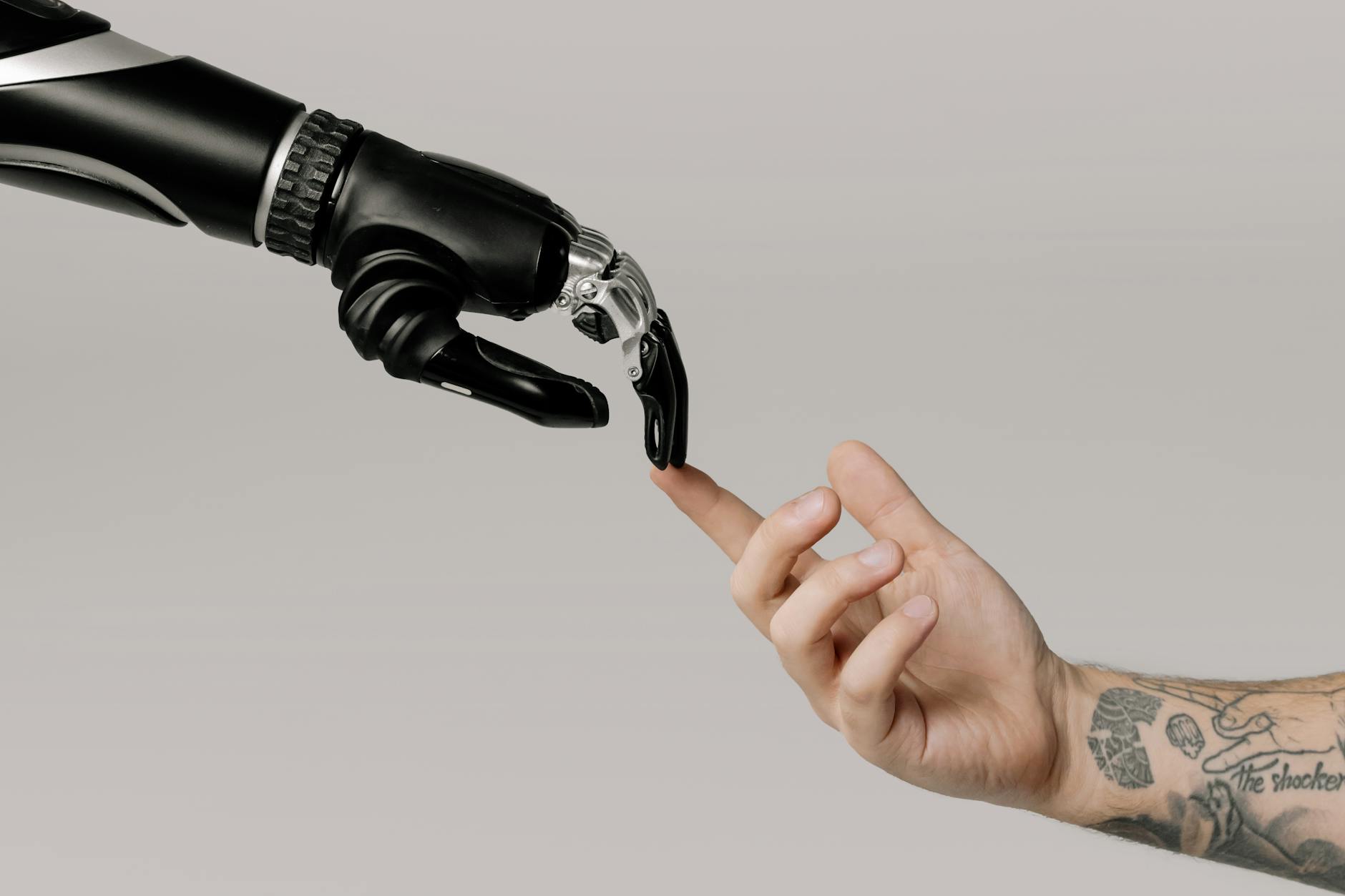 Photo by Markus Winkler
Photo by Markus Winkler
Unveiling the Convergence of Quantum Computing and Artificial Intelligence: A Paradigm Shift
Imagine a world where problems that take centuries for traditional computers to solve can be tackled in mere seconds (quantum artificial intelligence).
That’s the revolutionary promise of quantum computers, especially when coupled with artificial intelligence (AI). As we stand on the brink of this technological fusion, the potential is staggering. Quantum computing uses the principles of quantum mechanics to process information at speeds unfathomable to current technology, while AI excels in learning from data to make intelligent decisions.
Together, they are set to transform a myriad of industries including healthcare, where they could develop new treatments by quickly analyzing vast arrays of genetic data, or in finance, by calculating complex risk assessments almost instantaneously.
The intersection of quantum computing and AI not only enhances computational power but also extends the realms of possibility in problem-solving capabilities, opening up pathways to innovations previously thought impossible. In this rapidly evolving field, staying informed is crucial as each advancement could be the key to unlocking a future filled with unimaginable technological advances.
Understanding Quantum Computing and Artificial Intelligence
Quantum computing and artificial intelligence are two cutting-edge fields shaping the future of technology. Let’s delve into the basics to understand the core principles behind quantum computing and artificial intelligence.
Quantum Computing Explained
Quantum computing harnesses the principles of quantum mechanics to perform operations. Unlike classical computers that use bits, which can be either 0 or 1, quantum computers use quantum bits or qubits. These qubits can exist in multiple states simultaneously due to superposition, allowing quantum computers to process complex calculations at an unprecedented speed. Entanglement is another crucial concept where qubits can be interconnected, enabling them to influence each other instantaneously regardless of the distance between them. Key players in quantum computing research include IBM, Google, and D-Wave Systems, each making significant advancements in this field.
Artificial Intelligence Overview
Artificial intelligence (AI) refers to the simulation of human intelligence processes by machines, aiming to mimic human cognitive functions such as learning and problem-solving. AI is prevalent in various applications, including chatbots, recommendation systems, and autonomous vehicles. Traditional AI algorithms encompass rule-based systems and expert systems, while machine learning techniques like deep learning and reinforcement learning enable AI systems to learn from data and improve over time. As AI continues to evolve, its integration across industries is reshaping the way we interact with technology.
 Photo by cottonbro studio
Photo by cottonbro studio
The Synergy of Quantum Computing and Artificial Intelligence
Quantum artificial intelligence (AI) represents the convergence of two cutting-edge technologies, ushering in a new era of computing capabilities. By combining the power of quantum computing with the intelligence of AI systems, remarkable advancements are on the horizon.
Quantum AI Potential
When we delve into the realm of quantum AI, we encounter a realm of possibilities that can redefine the limits of traditional computing. Quantum machine learning stands out as one of the most promising areas where quantum algorithms can outperform classical machine learning models by processing vast amounts of data concurrently. Optimization tasks, such as complex systems simulations or financial modeling, can benefit from quantum computing’s ability to explore multiple solutions simultaneously, leading to more efficient outcomes. Moreover, the synergy of quantum computing and AI opens up avenues for enhanced pattern recognition, enabling systems to identify intricate patterns within datasets beyond the scope of classical AI.
Applications in Various Industries
The impact of quantum AI extends across diverse industries, promising revolutionary transformations. In healthcare, quantum AI can significantly accelerate drug discovery processes by swiftly analyzing molecular interactions and predicting drug efficacy. Financial institutions can leverage quantum AI for advanced risk assessment and fraud detection, enhancing security measures. Cybersecurity stands to benefit from quantum AI’s robust encryption methods, safeguarding sensitive data against evolving threats. Furthermore, in logistics, the optimization capabilities of quantum AI can streamline supply chains, reducing inefficiencies and enhancing operational agility.
From revolutionizing medical research to fortifying cybersecurity defenses, quantum AI’s applications showcase its potential to reshape industries fundamentally. As technology continues to advance, the integration of quantum computing and AI holds the promise of unlocking innovative solutions and propelling us into a future where the impossible becomes achievable.
 Photo by RDNE Stock project
Photo by RDNE Stock project
Challenges and Opportunities
Quantum artificial intelligence (AI) holds immense promise but also poses significant challenges that demand attention and innovation.
Technical Hurdles
Developing quantum AI systems faces a host of technical hurdles that require meticulous problem-solving. Error rates, a critical concern in quantum computing, can lead to inaccuracies in AI models. Scalability remains a challenge as researchers strive to expand quantum systems to handle complex AI tasks effectively. Coherence times, the duration a quantum system maintains its delicate quantum state, are crucial for sustaining computations but prove difficult to prolong in quantum AI implementations.
 Photo by Andrea Piacquadio
Photo by Andrea Piacquadio
Ethical Implications
The integration of quantum capabilities into AI systems raises ethical considerations that must be navigated thoughtfully. Data privacy becomes more intricate in the quantum realm, requiring robust security measures to protect sensitive information processed by quantum AI. Bias in algorithms, a prevalent issue in classical AI, demands heightened awareness when implementing quantum algorithms to ensure fairness and inclusivity. Moreover, AI safety concerns amplify with quantum AI’s potential for unprecedented computational power, emphasizing the need for rigorous safety protocols to prevent unintended consequences.
For further insights into quantum AI advancements and implications, explore reputable sources like Google Quantum AI, Forbes article on Quantum Artificial Intelligence, and Nature’s discussion on AI-quantum computing mash-up.
Stay informed about the convergence of quantum computing and artificial intelligence to grasp the transformative potential and associated challenges in this cutting-edge field.
Future Prospects of Quantum AI
The future of Quantum Artificial Intelligence (AI) holds immense potential, shaping innovation across various industries. Let’s delve into the research trends and commercial adoption forecasts of Quantum AI.
Research Trends
In the realm of Quantum AI, researchers are making groundbreaking strides, bridging the gap between quantum computing and artificial intelligence. Collaborative efforts from key players like Google’s Quantum AI Lab, IBM Quantum, and academic institutions are propelling advancements. Initiatives such as the Quantum AI Researchers (QuAIR) consortium are fostering interdisciplinary research, aiming to unleash quantum computing’s power for AI applications. Predictions suggest that quantum AI algorithms will revolutionize data processing, optimization, and machine learning, paving the way for unprecedented breakthroughs.
Commercial Adoption
The integration of Quantum AI technologies into businesses and society is a gradual but transformative process. Experts anticipate a significant uptick in commercial adoption within the next decade as quantum computing accelerates. Industries ranging from finance to healthcare are poised to leverage quantum AI for enhanced data analysis, risk assessment, and drug discovery. While challenges remain, such as quantum error correction and hardware scalability, the trajectory points towards widespread adoption of quantum AI solutions. This adoption timeline aligns with the exponential growth of quantum computing capabilities, promising a paradigm shift in how businesses harness AI for competitive advantage.

Photo by cottonbro studio.
Conclusion
In conclusion, the convergence of quantum computing and artificial intelligence represents a monumental shift in the technological landscape. The potential of quantum computer artificial intelligence to revolutionize industries and scientific research cannot be overstated. As researchers delve deeper into quantum machine learning and the development of quantum AI algorithms, the possibilities for innovation are limitless. The combination of quantum computing’s computational power with the intelligence of AI presents unprecedented opportunities for solving complex problems at an unparalleled speed and scale. The transformative impact of quantum computer artificial intelligence is imminent, and its implications are poised to redefine the boundaries of what is achievable in the realm of technology.